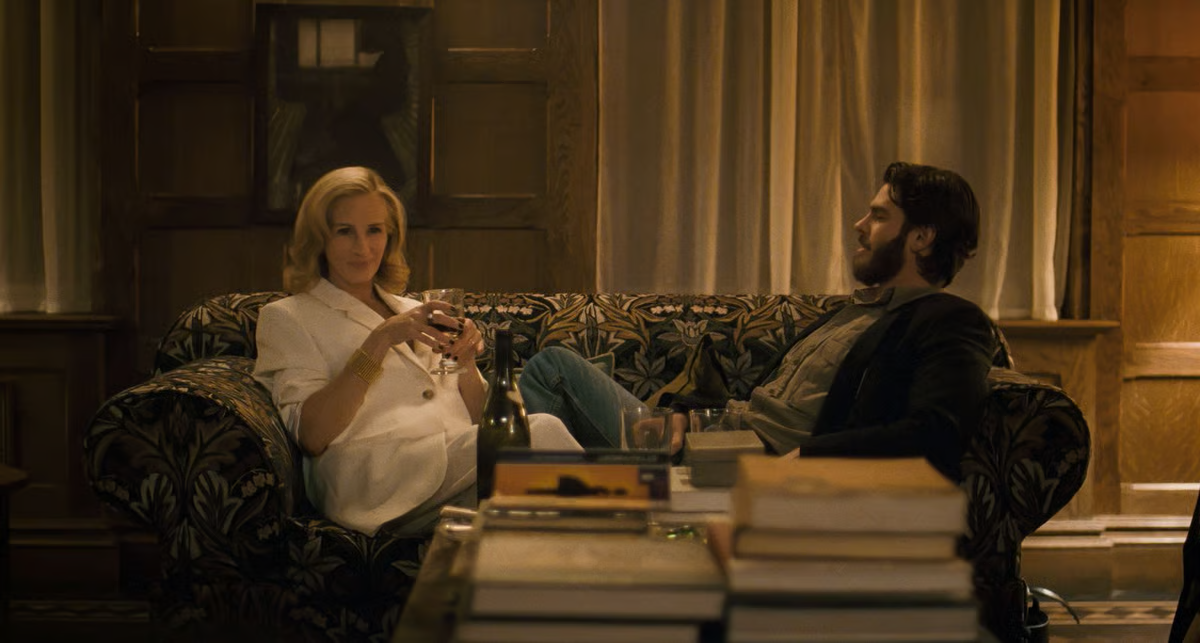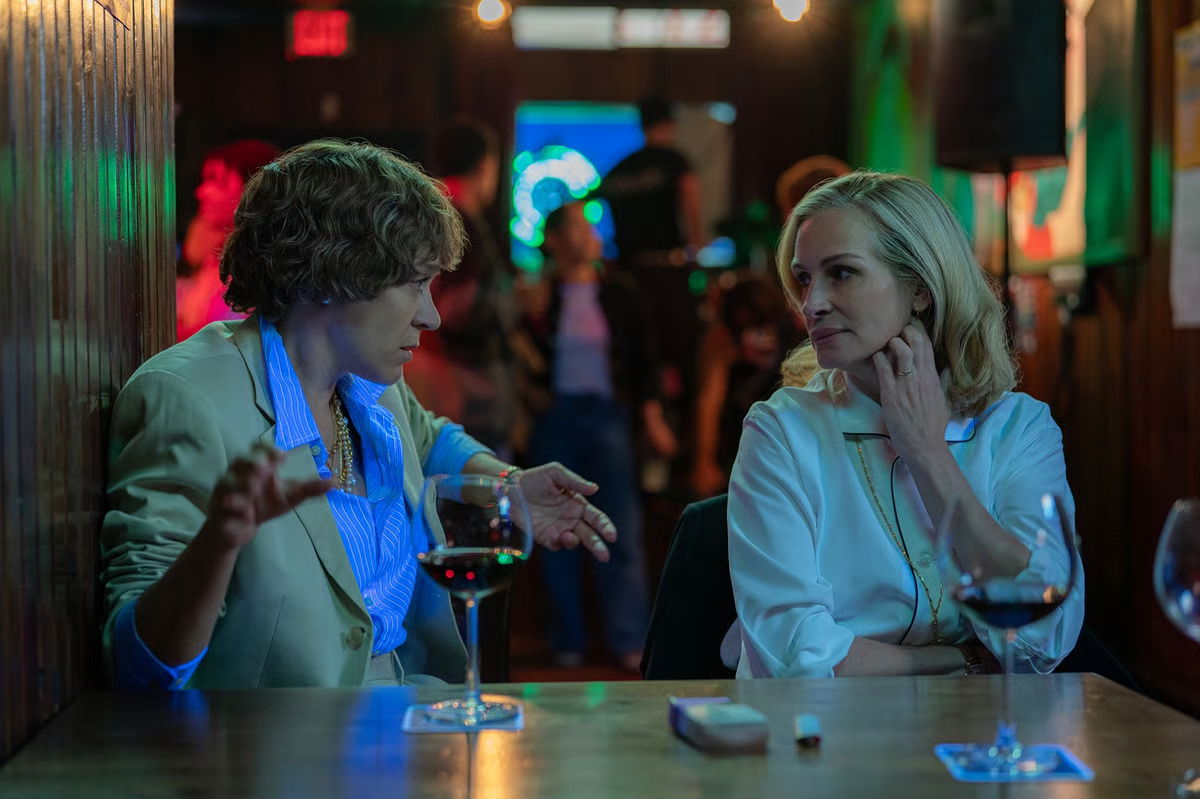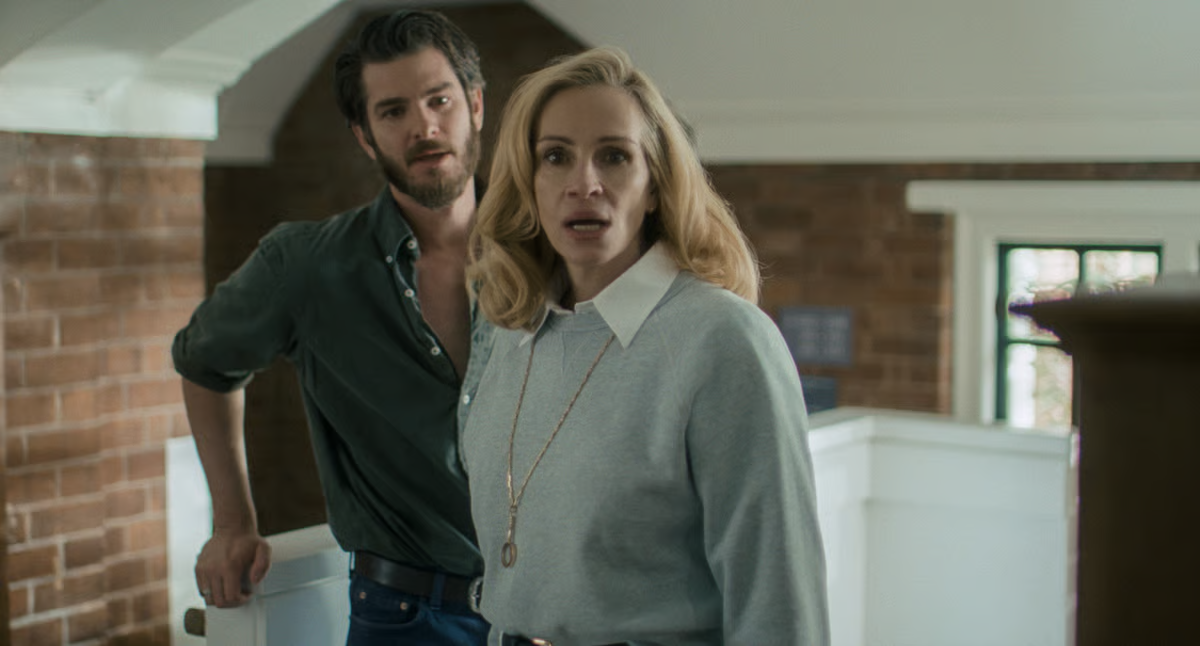‘After the Hunt’ Review: Julia Roberts Leads Luca Guadagnino’s Polarizing Drama of Power, Ethics, and Over-Intellectualized Chaos
After the Hunt. Courtesy of Amazon MGM Studios.
Not Luca Guadagnino’s best, but an intriguing and fiercely acted take on generational morality and #MeToo-era power dynamics that confuses intellect for depth but captivates through tension and style.
Luca Guadagnino has never been afraid of discomfort. From the erotic tension of A Bigger Splash to the aching sensuality of Call Me by Your Name and the chaotic yearning of Challengers, his cinema has always thrived in spaces of contradiction — beauty tangled with guilt, desire intertwined with destruction. With After the Hunt, however, Guadagnino trades sensual heat for cerebral chill, crafting a film that replaces the physicality of passion with the precision of debate. The result is fascinating, provocative, and, at times, maddeningly airless — a high-concept academic melodrama that aims for intellectual rigor but often drowns in its own self-seriousness.
Premiering as the Opening Night selection of the 63rd New York Film Festival, After the Hunt arrives with major expectations and a powerhouse cast: Julia Roberts, Ayo Edebiri, Andrew Garfield, and Michael Stuhlbarg, all under Guadagnino’s exacting lens. The premise — a sexual assault accusation that fractures Yale’s philosophy department — promises an incisive exploration of power, privilege, and perception. What unfolds instead is a film less interested in offering answers than in interrogating how we construct them.
Roberts plays Alma Imhoff, a tenured philosophy professor whose entire life runs on precision: clean lines, ironed blouses, moral clarity. She teaches her students about virtue ethics and moral philosophy with the confidence of someone who has built her identity around order. But that composure begins to crack when her close friend and colleague Hank Gibson (Garfield) is accused of sexual assault by Alma’s prized student Maggie (Edebiri). What follows is not the procedural unraveling of a scandal but the implosion of a belief system.
After the Hunt. Courtesy of Amazon MGM Studios.
From its opening frames — scored by Trent Reznor and Atticus Ross’s anxious, percussive hum and framed by Sayombhu Mukdeeprom’s crisp, claustrophobic cinematography — Guadagnino situates the film in a world where time, intellect, and emotion collide like trapped atoms. Every ticking clock and echoing hallway carries the weight of judgment. Guadagnino has described the film as “a philosophical thriller,” and it’s an apt label: each conversation is a duel, each lecture a battle between conviction and collapse.
For Roberts, After the Hunt represents a career pivot. Her Alma is sharp, unflinching, and often unlikeable — a woman whose authority stems from restraint. There’s no trace of Roberts’s trademark warmth here; she weaponizes her composure, delivering dialogue with surgical precision. When Maggie arrives at her doorstep, drenched and trembling, recounting how Hank “wouldn’t stop,” Alma listens — but doesn’t comfort. Her response is intellectual, not emotional. Her instinct isn’t empathy but analysis.
It’s a performance defined by denial — not just of truth but of feeling. Even as Alma’s own buried trauma surfaces through migraines, nausea, and panic attacks, she remains unwilling to acknowledge it. Roberts’s control is astonishing; her face becomes a study in repression. Every microexpression is calibrated, every breath measured, as if Alma herself is terrified of being observed too closely. It’s a role that strips Roberts of her movie-star armor and dares her to be ugly — morally, emotionally, spiritually.
After the Hunt. Courtesy of Amazon MGM Studios.
If Roberts provides the film’s spine, Ayo Edebiri gives it its heartbeat. As Maggie, she’s the lone source of vulnerability in a film populated by intellectual predators. Her performance, understated yet deeply felt, grounds the film’s abstractions in lived experience. When she later sees her assault transformed into gossip and policy debate, Edebiri captures the exhaustion of someone watching her pain become a seminar topic. Her scenes with Roberts are electric — a generational standoff between authority and authenticity, intellect and emotion.
Andrew Garfield, meanwhile, channels his boyish charm into something menacing. His Hank is the embodiment of academic entitlement — brilliant, charismatic, but deeply self-justifying. When accused, he doesn’t deny the encounter but reframes it as “misunderstood intimacy.” Garfield’s late-film explosion in the university hallway — a furious monologue about merit, class, and resentment — is one of the film’s most riveting sequences, a moment that blurs the line between confession and self-destruction.
After the Hunt. Courtesy of Amazon MGM Studios.
Rounding out the ensemble is Michael Stuhlbarg as Alma’s husband, Frederick — a psychiatrist whose calm erodes into jealousy and moral hypocrisy. His scenes, often infused with dark humor, reflect the film’s central irony: the people most capable of analyzing morality are often the least capable of practicing it.
Guadagnino’s direction is meticulous, almost too much so. Working with longtime cinematographer Mukdeeprom, he transforms Yale’s Gothic architecture into a visual metaphor for power — symmetrical, impenetrable, cold. His camera glides through lecture halls and faculty dinners like an omniscient observer, lingering on faces just long enough to make us question what’s hidden behind them. The visual precision is breathtaking, but it also reinforces the film’s detachment.
After the Hunt. Courtesy of Amazon MGM Studios.
The script, by Nora Garrett, oscillates between brilliance and excess. Garrett, a first-time screenwriter, writes dialogue that feels designed for dissection — sharp, verbose, and intentionally uncomfortable. The film’s middle act, in which debates about “virtue ethics” and “institutional complicity” unfold in faculty meetings, becomes both mesmerizing and exhausting. Guadagnino’s insistence on realism — letting scenes play out without cuts, allowing arguments to stretch into uncomfortable silences — turns intellectual discourse into endurance theater.
There’s a moment late in the film when Alma, after publicly humiliating Maggie, stands before a mirror and mutters, “I can’t tell where my thoughts end and theirs begin.” It’s the film’s thesis statement: a recognition that moral certainty is an illusion. After the Hunt thrives on that ambiguity. But its greatest flaw is mistaking opacity for profundity.
For all its ambition, the film feels strangely hollow. It circles around questions of justice, gender, and power without ever engaging emotionally with them. The final act — a five-year time jump that offers no closure — is clearly designed to provoke debate, but instead it leaves viewers unsatisfied. The film’s ambiguity feels less like mystery and more like avoidance, a refusal to risk sincerity.
After the Hunt. Courtesy of Amazon MGM Studios.
Still, there’s no denying the magnetism of Roberts’s performance. Watching her navigate the minefield of academia, illness, and moral decay is mesmerizing. Her breakdown scene — a wordless moment in which Alma collapses in her office as the ticking clock grows deafening — is one of Guadagnino’s most haunting images. It recalls his best work in I Am Love and Suspiria, where emotion erupts through control.
Yet what separates After the Hunt from those earlier triumphs is its absence of sensuality. Guadagnino’s cinema has always been about feeling — tactile, physical, alive. Here, he trades touch for talk, heat for abstraction. The result is intellectually rich but emotionally inert, a film that commands admiration more than affection.
POPULAR ON THE CINEMA GROUP
Perhaps that’s intentional. Guadagnino seems to be interrogating his own tendency toward beauty, testing whether he can make a film that’s provocative through thought rather than texture. The experiment succeeds in concept, but falters in impact. We leave the theater admiring its construction yet longing for the human pulse beneath it.
When the credits roll, After the Hunt feels less like a story than a seminar — one hosted by brilliant minds who never quite realize they’re lecturing to an empty room.
Rating: ★★★½☆
That's A Wrap
|
After The Hunt [2025]
|
That's A Wrap | After The Hunt [2025] |
“Julia Roberts delivers one of her most daring late-career turns in After the Hunt, a sharp, cerebral, and divisive academic thriller. Guadagnino’s film is stunningly crafted and deeply committed to its ambiguity—provocative, cold, and impossible to stop thinking about.”
CREDITS
Airdate: September 26, 2025 | NYFF63 Opening Night | Alice Tully Hall
Cast: Julia Roberts, Ayo Edebiri, Andrew Garfield, Michael Stuhlbarg, Chloë Sevigny, Lío Mehiel
Director: Luca Guadagnino
Writer: Nora Garrett
Distributor: Amazon MGM Studios
Release date: Friday, Oct. 10
Rating: R




























